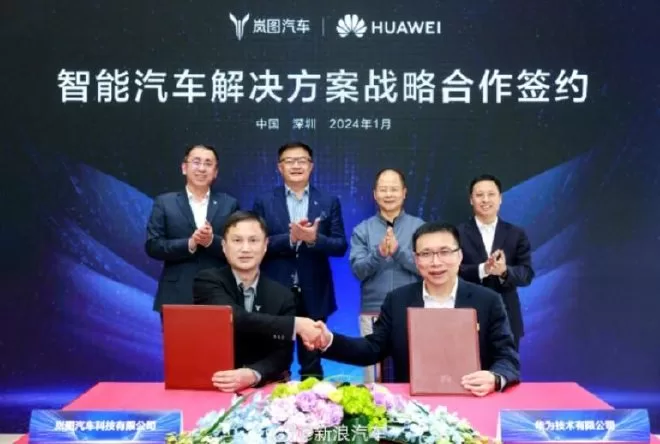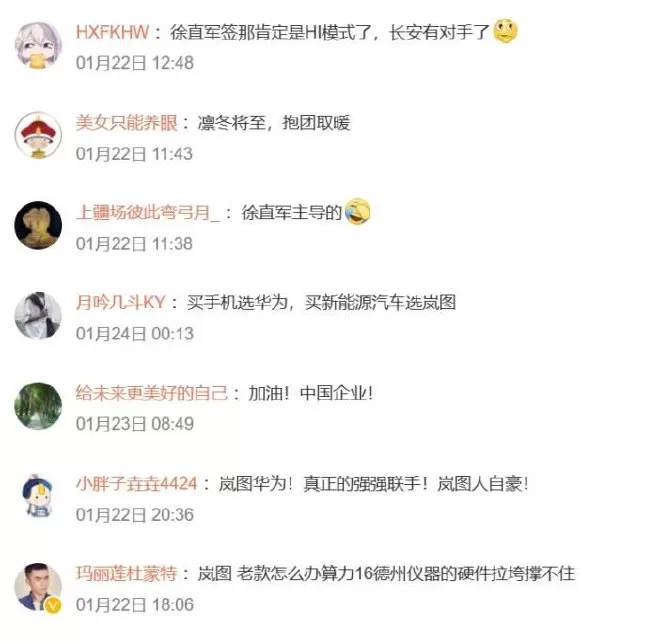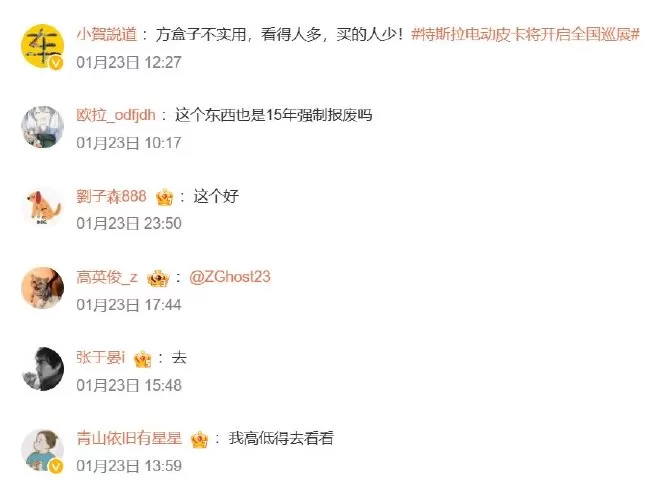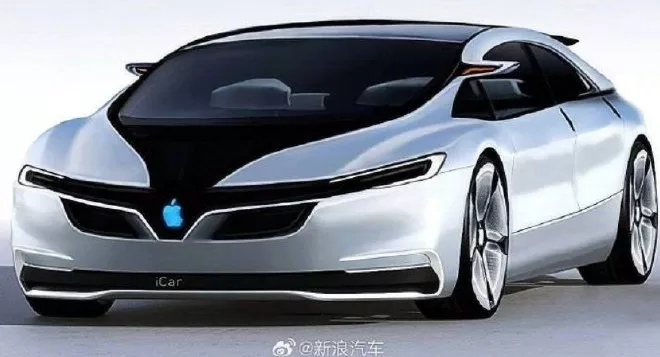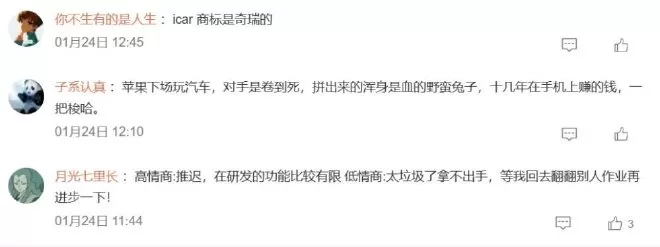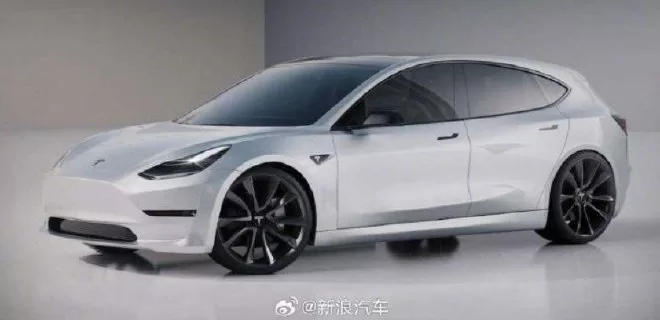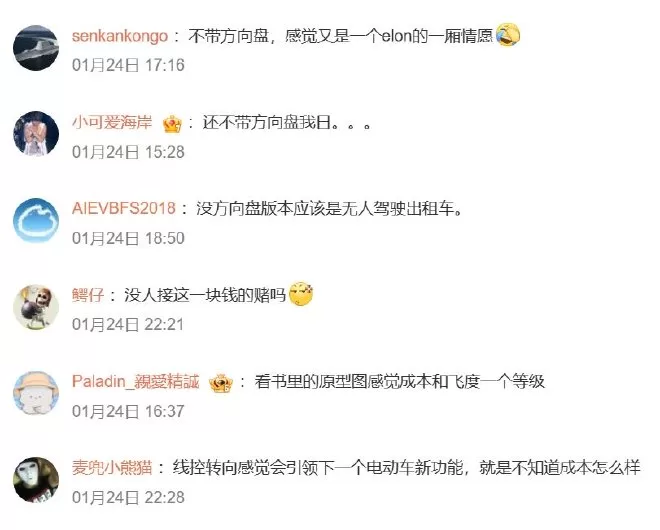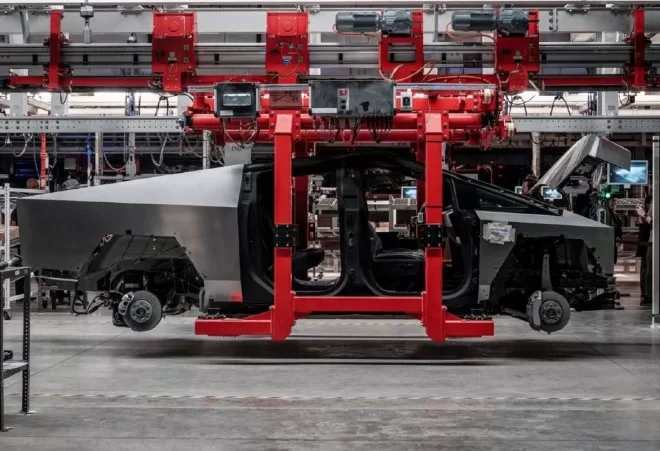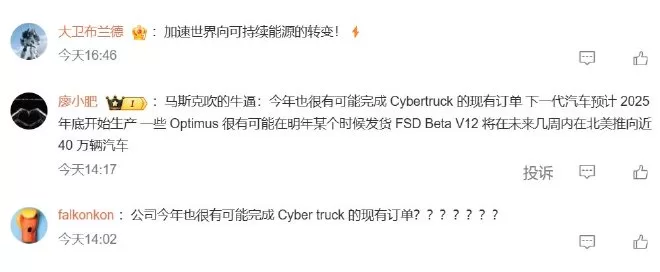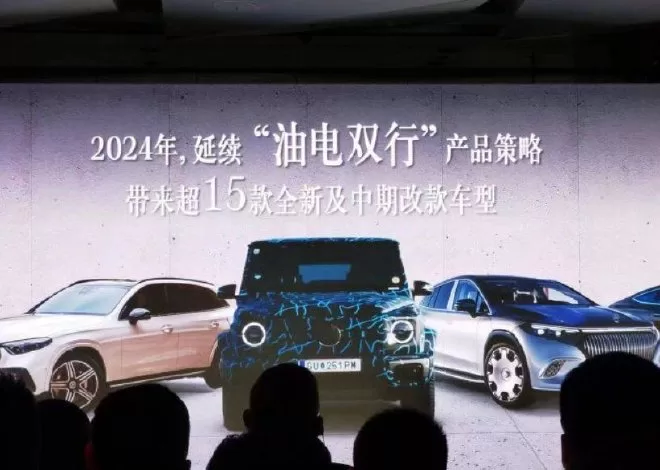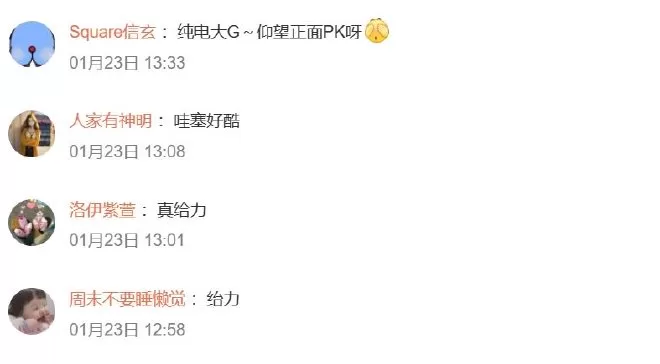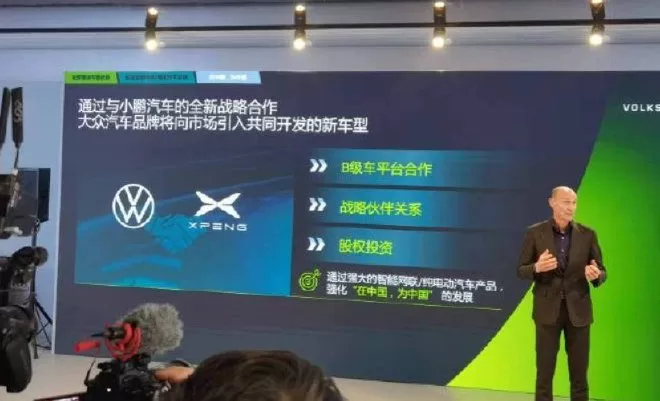New energy vehicles are still a hot topic. LanTu and Huawei have signed a strategic cooperation agreement. The next car company to sign with Huawei will be who? Tesla’s Cybertruck will start a tour in 8 cities nationwide. Mercedes-Benz will bring a new electric product matrix in 2024. Let’s see what sparks will be created in the Chinese market. Let’s review this week’s hot topics on Weibo. #LanTu and Huawei sign a strategic cooperation agreement#
Earlier, @Lantu Automobile posted: “We will fully leverage our respective strengths, jointly create the ultimate smart travel experience around user needs, and jointly promote the high-quality development of the automotive industry. Through collaborative models, we will explore innovation in multiple fields and accelerate the large-scale commercialization of intelligent technology.”
In 2024, we may see more and more collaborations between different brands and manufacturers in the automotive industry. Learning from each other and achieving win-win results should be a major feature of the industry’s development in 2024. The collaboration between Xiaopeng Motors and Volkswagen may become more frequent in 2024. Each manufacturer has its own technological advantages, especially in the era of intelligence and electrification, domestic car companies have far more accumulation in this area than overseas brands. In the current environment of great opportunities and unprecedented challenges, collaboration is undoubtedly a wise choice. Chinese car companies are well aware of the principle of “one hero needs three helpers,” and know that going it alone is not a long-term solution. By fully leveraging their own strengths and collaborating with different brands, they can accelerate intelligent development through cooperation and innovation in more areas. The collaboration between Lantu and Huawei will definitely increase in the future. #Tesla Cybertruck to kick off national tour#
Earlier, @Tesla posted: “Cybertruck is coming, nationwide tour will soon begin.” If Cybertruck comes to your area, will you go see it?
Tesla’s Cybertruck, the culmination of the latest technology under the Tesla brand, is set to embark on a national tour, stirring up excitement among Tesla enthusiasts and fans of cutting-edge automotive technology. With its highly distinctive appearance and incorporation of various advanced technologies, the Cybertruck has garnered significant attention since its debut. While overseas bloggers have conducted extreme tests to assess the bulletproof and structural properties of the Cybertruck, domestic fans are still concerned about whether this Tesla model will be produced in China. The national tour of the Cybertruck undoubtedly provides an excellent opportunity for a close-up viewing experience while the question of domestic production remains unanswered. As the largest market for new energy vehicles, China holds great significance for Tesla, and the company’s decision to assess the popularity of the Cybertruck through the tour reflects a prudent approach. Despite the differences between the Chinese and American markets, the tour will provide valuable insights to inform future decisions. Regardless, if the Cybertruck comes to my city, I will definitely go see it. How about you? #Apple car may be delayed until 2028#
Renowned Apple insider Mark Gurman wrote that Apple will delay the launch of its self-developed car and also lower the target for autonomous driving technology.
Many tech giants have entered the automotive industry, such as Xiaomi and Huawei in China. Leveraging their technological expertise and strong user reputation, these companies have performed well so far. For a globally renowned tech giant like Apple, entering the automotive industry is undoubtedly of great interest to everyone, but for Apple itself, long-term strategic planning is more important than just interest. Vehicle development and manufacturing involve multiple disciplines and are not something that can be easily accomplished. With the advent of the new energy era, the automotive industry has undergone tremendous changes. It is certain that Apple does not want to create an ordinary car, but rather an extraordinary one, just like the groundbreaking impact of the iPhone when it was first introduced. With this guiding principle, it is not difficult to understand why the Apple car has not been launched yet. Many people may wonder what kind of car Apple wants to create. It is likely to be an unprecedented smart car, at least with Level 4 or Level 5 autonomous driving capabilities. Inside the car, traditional steering wheels and pedals will be replaced by more intelligent remote control equipment. As for the exterior and other aspects, there is ample reason to believe that Apple will integrate fashion, safety, and unique features into the new car, making it truly one-of-a-kind. If such an Apple car were to be released, would you buy it?
According to overseas media reports, Tesla will start production of a compact crossover codenamed Redwood in June 2025. The car is expected to be priced at $25,000 and is likely to be the next generation product following the Model 3/Y. Insiders revealed that the next generation platform, codenamed NV9X, will include two or more models and will be available in versions with and without a steering wheel.
“Affordable car” is not Tesla’s first public announcement of similar news, and to this day, no new car from Tesla has appeared. If the rumors are true, this compact car will be priced at around $25,000, definitely encroaching further into the market of traditional compact fuel cars, and in the field of new energy, this price range will inevitably become more competitive due to Tesla’s involvement, further lowering the threshold for entry into smart cars. However, Tesla insiders quickly responded to such reports, saying, “We have never heard of the above-mentioned Tesla producing a new car model.” Elon Musk had stated as early as 2018 that it would take 3 years to develop a low-cost electric car model. Musk has admitted that developing such a car is “very difficult” given the economic situation and competitive environment in the automotive industry. In 2020, Musk delayed the timetable for the affordable electric car by 3 years. In November 2023, it was reported that Tesla plans to develop an entry-level electric car model at its factory in Berlin, Germany. However, these rumors have not yet received an official response from Tesla. Another issue worth noting is the timing. Assuming this news is true, this new car will not be available until mid-2025, with 2 and a half years of uncertainty in the market. Whether this pace of development can capture the best timing is also worth considering, as the current car market is constantly changing, and Tesla will not make hasty decisions.
On January 25, Tesla released its 2023 annual financial report. The report shows that the total production for 2023 was 1,845,985 vehicles, with deliveries reaching 1,808,581 vehicles, including over 1.2 million Model Y vehicles. The annual energy storage business installed capacity was 14.7GWh. The gross profit margin for the year was 18.2%, with a net profit of 9.2%. The energy department’s revenue from selling solar power and energy storage systems grew by 54% to reach $6.04 billion.
The most attention-grabbing aspects of new energy vehicle companies right now are delivery capability and profitability. Without delivery, there can be no profit, and cost control reflects a company’s technology, management, and other factors. Among global new energy vehicle companies, Tesla has been recognized for both of these capabilities, making it a target for learning and catching up for new energy vehicle companies worldwide. According to data from overseas analysis agencies, Tesla’s delivery volume in 2024 is expected to be lower than expected, at 1.97 million vehicles, below the market’s general expectation of 2.1 million vehicles. This number is far below Tesla’s previously set target of a 50% compound annual growth rate, further highlighting Tesla’s competitive pressure in the global electric vehicle market. Overall, however, Tesla’s full-year operating income in 2023 was over 50% lower than the high-speed growth of the previous two years, with income growth slowing down. In terms of market actions, Tesla carried out a series of profit-sacrificing operations to maintain market share last year, such as price reductions and promotions in the Chinese market, resulting in a nearly 50,000 yuan (7050$) decrease in the average transaction price for the Tesla Model Y, entering the 300,000 yuan (42280$) range. Another point worth noting is Tesla’s research and development investment, with full-year R&D expenses reaching $3.969 billion, the highest in history and far exceeding other new energy vehicle companies. Tesla CEO Musk stated during the earnings call that focusing on technological innovation and product development has become Tesla’s DNA. In 2024, Tesla will continue to increase its investment in product development to bring better products to consumers. Musk also stated that despite reaching the highest values in company history for capital expenditure and R&D expenses, Tesla’s free cash flow in 2023 remained strong at $4.4 billion. Therefore, Tesla’s performance in 2024 is still worth looking forward to.
At the 2024 Mercedes-Benz Spring Tea Reception, Duan Jianjun, President and CEO of Beijing Mercedes-Benz Sales Co., Ltd., stated that in 2024, Mercedes-Benz will continue its “dual-track of oil and electricity” product strategy, bringing more than 15 new and mid-term facelift models covering multiple product matrices.
Mercedes-Benz is confident in the Chinese market and plans to continue accelerating in 2024. In 2023, they delivered approximately 765,000 new cars to Chinese customers, maintaining steady growth in the high-end luxury segment. The focus in 2024 will be on their new electric lineup, including the pure electric G-Class and the new Maybach EQS SUV. Mercedes-Benz is also partnering with BMW to establish a new ultra-charging company in China, with plans to build at least 7,000 ultra-charging piles and 1,000 supercharging stations by the end of 2026, indirectly enhancing their competitiveness in the electric market.
On January 25, during the Volkswagen Group’s New Year media briefing, Chairman and CEO Herbert Diess announced that Volkswagen will partner with Xiaopeng Motors to produce two B-class cars in 2024.
As mentioned earlier, in the increasingly competitive environment, it is best to join forces and complement each other’s strengths. This is true for traditional joint venture car companies that urgently need to strengthen their new energy weaknesses, and even more so for emerging new forces. Xiaopeng Motors has definitely learned a lot of useful and valuable things from its partnership with Volkswagen. Xiaopeng stated, “At present, the cooperation between Xiaopeng Motors and Volkswagen China is very efficient.” In addition, Xiaopeng Motors will also learn from Volkswagen in terms of car engineering technology, production quality management systems, and how to reduce costs through the supply chain, and jointly develop software and hardware integrated products in China. These are invaluable to Xiaopeng Motors. In the fiercely competitive environment, they are not opponents, but partners. They can benefit from each other. The truth in the market will not change, it is always “survival of the fittest, natural selection.” Their competitiveness will be enhanced after joining forces, and it will inevitably promote efficiency in research and development and transformation, with better results. This is also a good thing for Volkswagen, which has a strong consumer reputation in the Chinese market, and a key opportunity for rapid development during the critical period of transitioning to new energy, as Volkswagen highly values its cooperation with Xiaopeng from top to bottom. In October of last year, He Xiaopeng posted on Weibo that he visited the Volkswagen Group headquarters in Wolfsburg at the end of September. “The technical teams on both sides are like a start-up team, fully committed and moving forward at full speed for the common goal; the strategic cooperation in the supply chain will bring us the potential to reduce costs together.” As for the progress of the highly anticipated cooperation between the two parties on new car models, in December of last year, Xiaopeng announced through a public announcement that the feasibility study of the two jointly developed B-class pure electric car projects had yielded positive results and had been completed. Both sides are actively evaluating deeper strategic cooperation in smart electric vehicle technology. What kind of two new products can they bring to consumers? Let’s wait and see.
